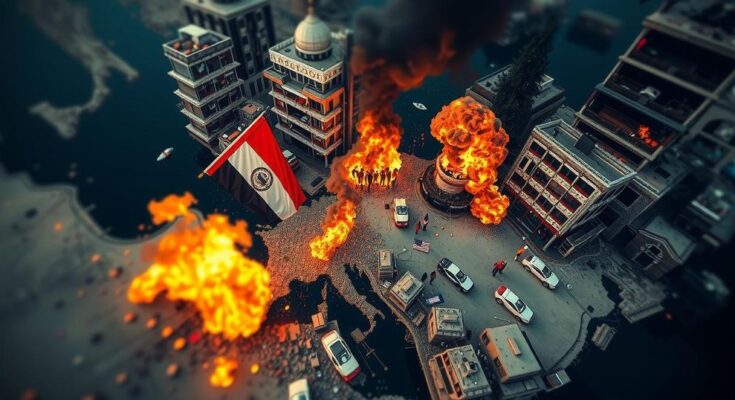U.S. officials are seeking to mediate the escalating conflicts in Gaza and Lebanon as humanitarian conditions decline. Recent Israeli airstrikes have resulted in significant civilian casualties and have impeded aid deliveries, prompting international concerns about an impending Iranian response. The situation remains critical as diplomatic efforts aim for a ceasefire while addressing worsening humanitarian conditions.
U.S. officials are heading to the Middle East with renewed efforts to mediate the ongoing conflicts in Gaza and Lebanon, particularly to prevent a potential Iranian retaliation following recent Israeli military actions. Lebanese Prime Minister Najib Mikati expressed optimism for a ceasefire between Israel and Hezbollah in the near term, possibly within hours or days. In the meantime, Iranian officials have indicated a likelihood of a significant response to Israel’s strikes, particularly in light of the impending U.S. presidential elections. The White House has urged Iran to refrain from retaliatory action, while simultaneously pledging support for Israel’s defense. Israeli military actions have resulted in significant casualties; reports indicate airstrikes near Baalbek in Lebanon resulted in the deaths of at least 19 individuals. The attacks have exacerbated an already dire humanitarian situation in Gaza, where aid deliveries have reached record lows according to UN data. In October, a mere 836 trucks had entered Gaza, sharply contrasting with the pre-war average of 500 trucks per day. Medical facilities in northern Gaza are struggling under continual bombardment, with reports confirming that the Kamal Adwan Hospital, the only operational hospital in the region, sustained damage during recent strikes that crippled vital medical supplies. Medical personnel have described the conditions in Gaza as increasingly catastrophic due to ongoing hostilities. The U.N. Security Council has voiced grave concerns regarding Israel’s latest legislative moves to restrict the operations of the United Nations Relief and Works Agency (UNRWA), a key institution providing aid to Palestinian refugees, highlighting the potential for a worsening humanitarian crisis in Gaza without its support. Overall, the situation remains critical, with ongoing military engagements posing severe risks to civilians and critical infrastructure in both Gaza and Lebanon.
The Middle East, particularly the regions of Gaza and Lebanon, has long been a focal point of conflicts stemming from historical, political, and territorial disputes. The most recent escalation has resulted in heightened military actions, deteriorating humanitarian conditions, and the involvement of international powers seeking to mediate peace. Recent developments have included discussions regarding a potential ceasefire between Israel and Hezbollah, while Iran’s positioning in response to Israeli actions plays a pivotal role in the broader dynamics of the conflict. The humanitarian crisis in Gaza is exacerbated by blocked aid and continual military strikes, which have drawn international scrutiny and calls for action from various authorities, including the United Nations.
In conclusion, the current situation in the Middle East remains fraught with tension as U.S. officials attempt to broker peace efforts in the face of escalating violence. The implications of Iran’s potential response to Israeli actions, coupled with the urgent humanitarian needs in Gaza, underscore the complexity and volatility inherent in this conflict. The international community continues to monitor developments closely, emphasizing the need for sustained dialogue and humanitarian assistance to alleviate the suffering faced by the affected populations.
Original Source: www.cnn.com




